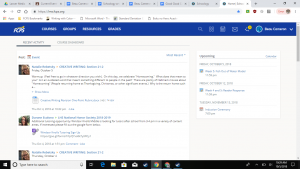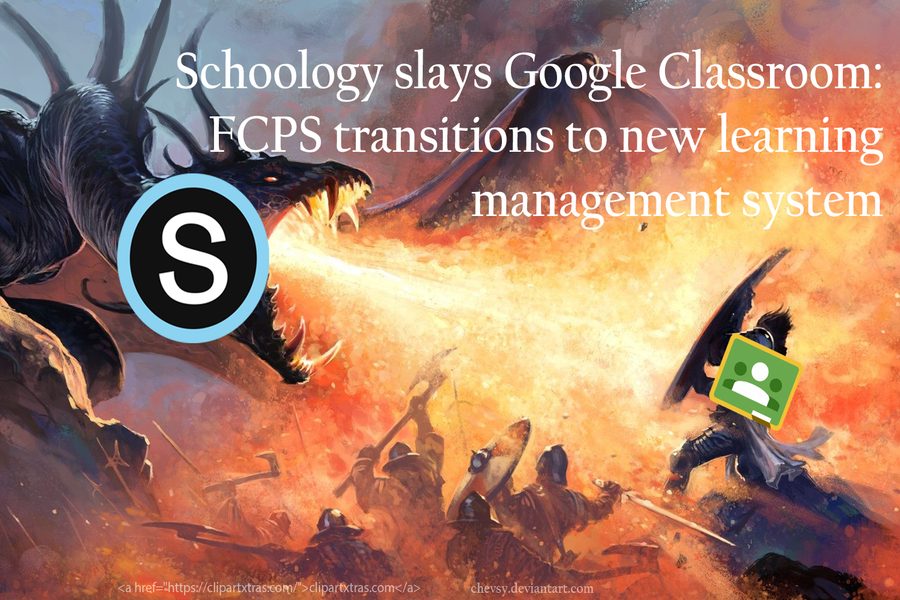Schoology slays Google Classroom: FCPS transitions to new learning management system
graphic by Spencer Derrenberger
FCPS is transitioning to Schoology to take advantage of more flexible platform and access to grades.
October 8, 2018
FCPS is implementing a new learning management system in all Frederick County Schools: Schoology. This year, teachers have the option to use it, but FCPS plans for Schoology to replace Google Classroom and the HAC grading system entirely in 2019-2020.
“We tested a lot of different systems before we settled on this one. As of this moment, FCPS has a five-year contract with Schoology that can be revisited each year,” said FCPS Achievement Specialist Amy Cordes, who is managing the transition. “Over the course of the next few months we’ll be collecting information from teachers about accessibility and how students and parents are engaging with the platform. Then we’ll make our decision on how to move forward.”
According to Cordes, throughout the year, FCPS will be reviewing usage information and gathering feedback before setting requirements for the use of Schoology in the 2019-2020 school year. FCPS teachers are receiving instruction in the new system, and several LHS classes are early adopters and have switched over to Schoology.
In this new initiative, many students aren’t yet on board with the whole system.
“Having to relearn how to do work online is frustrating when we all know how to use Google Classroom, and most teachers are still using Google Classroom,” said Class of 2019 Katie Lehman.
Senior Alexis Keeling said, “We’re almost always switching systems every two or so years. Students don’t really ever get a chance to learn a new system before we’re on to a new one.” HAC and Google Classroom have been in place for over five years, but many teachers are just starting to utilize Google Classroom efficiently.
Complaints that Schoology is unnecessarily complicated, and there doesn’t appear to be reason to change are students’ biggest concern. Part of the problem is that teachers are still in the learning phase, so students are, proverbially, “the last to know.”
Ivan Casanova, the Executive Vice President of Marketing for Schoology, said, “Using technology in the classroom can be an adjustment at first, which is why many teachers or districts begin their edtech journey with Google Classroom and other productivity tools. But, for districts to continue to grow and take digital learning to the next level, they need more than just a classroom solution. They need something that can scale and have a broader impact.”
Government teacher Jamie Hendi said, “I like Schoology much better. It’s much more user friendly and much more organized. I’m building out to use it for my World War II class in the spring. What’s great is that once we finish Unit 1, I’ll be able to unpublish all the stuff from it, so it won’t clutter up the feed. But it’ll be in a folder, so students can still access it.
“The discussions in Schoology are so much better. I’ve found that in Google Classroom, all the students will just look back and copy what everyone else has said. But in Schoology, I can block them from seeing other students’ responses and block them from reposting. Once they turn it in, that’s it. So they can’t copy off other people and then re-submit,” she said.
For students who are used to writing on Google Docs, they have the option to link their Schoology accounts to the Google Drive. They can upload documents from there and turn them in as assignments.
Schoology isn’t just replacing Google Classroom; it’s also taking the place of HAC. That way, assignments and grades will be in one place.

Hendi said, “It’s so much better than HAC, too. In HAC, I can’t see if I’ve left a comment, but in Schoology, it’s right there. Then it’s much more transparent for the parents who can see all the grades and all of my comments right there.”
“The most important benefit of Schoology is that it brings the entire teaching and learning experience together into one digital space. As all of the teachers in the district onboard and start using Schoology, everything that teachers, admins, students, and parents need to be successful lives on Schoology,” said Cassanova.
What most students may not realize is the difficulties presented to teachers by Google Classroom. Media Specialist and member of the leadership team Ms. Marsha Thompson said, “Assignments graded on Schoology immediately transfer to the gradebook. Classroom doesn’t do that. Schoology is a lot less clicking for teachers and a lot less work.”
However, Schoology isn’t perfect. According to Patti Kolias, The Alliance School District in Ohio, where she used to teach, switched out of the Schoology platform less than three years after transitioning to it. They are currently using ESchool Plus and the PowerSchool Student Information System.
Kolias said, “Right now, teachers are having to input grades into HAC and Schoology. If it becomes one platform, or I can push a button and transfer my grades, then I’ll be okay with using Schoology.” Because she has prior experience, Kolias has offered to help teachers to use the new system.
Learning the system takes time, and there is a learning curve. Chemistry teacher Jessica Baker said, “Schoology is supposed to automatically transfer grades, but it doesn’t yet. And it doesn’t update automatically, so there are a lot of bugs, and I don’t know how to fix them, or when they’re fixed. Google Classroom is more user-friendly. It’s easy to find coursework and know when it’s due. It can automatically load stuff to a Google Calendar and send notifications.”
Principal Nancy Doll said that the reason behind the switch is simply because of a desire to make our digital learning environment more accessible for teachers and students. Schoology has more features than Google Classroom.
Schoology is also closed circuit: FCPS Schoology can control who has access to students’ information in a way they couldn’t with Classroom.
The FCPS website lists an additional advantage: “It enables students, parents and teachers to engage with learning materials in a safe, secure, single sign-on environment.”
Cordes said, “With Google Classroom, people can’t have the same kind of access to information. Parents can’t see Google Documents. But in Schoology, a parent can see their student’s work through the parent portal. It allows for more transparency.”
Schoology has over 20 million users across over 60,000 schools around the world. Local users include Baltimore County Public Schools and Calvert County Public Schools and, internationally, Uruguay’s Plan Ceibal, and Cempaka Schools in Malaysia.
While unfamiliar to Linganore students, Schoology has been growing its influence world-wide since it was established in 2009. Right now, it may seem frustrating, but FCPS is confident that the switch will be beneficial in the long-run.




Greg Terwillerger • Sep 10, 2019 at 9:42 pm
I have used Google Classroom only as a parent, and I can’t stand it. I have used Schoology as a teacher, and I love it.
My biggest concern about GC is that Google will create a marketing profile for its users such that they will be heavily targeted by ads when the kids reach an age that allows for the tidal wave of those ads to begin hitting their browsers. The users’ preferences are being collected in stealth mode under the guise of creating a better educational experience on the web.
If an online service is free, we are the commodity.